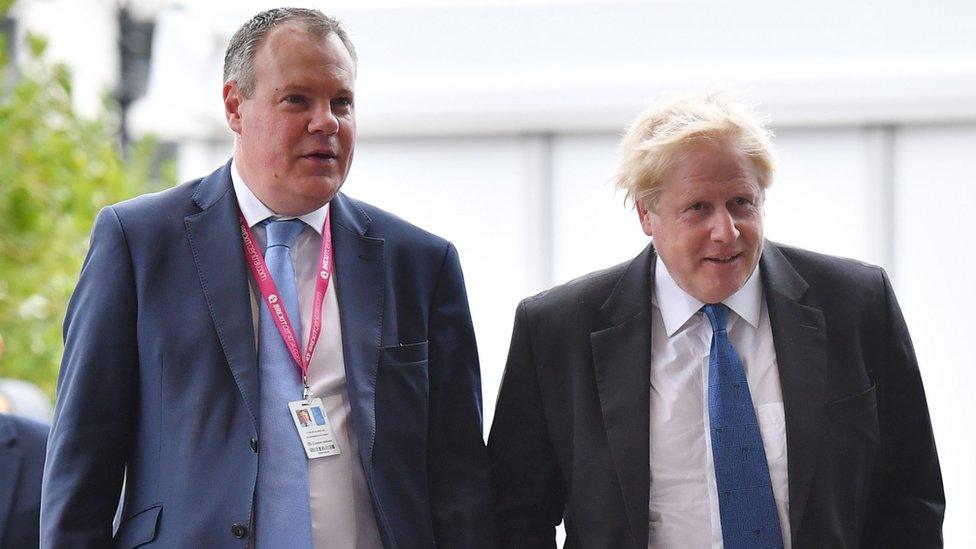Trade minister Conor Burns resigns over 'veiled threats' in letter
- Published

Conor Burns with Boris Johnson at the 2018 Tory conference
Conor Burns has resigned as a trade minister after a report found he used his position as an MP to intimidate a member of the public.
The Commons standards watchdog, external said he made "veiled threats" to use parliamentary privilege to "further his family's interests" in a financial dispute involving his father.
It had called for him to be suspended from Parliament for seven days.
Mr Burns said he accepted the sanction "unreservedly and without rancour".
In a letter to Prime Minister Boris Johnson after his resignation, he said the recommendation for a suspension made his decision to quit his post "inevitable".
In February, Mr Burns wrote to a member of the public connected to a company with whom his father was in dispute over the repayment of a loan.
He had written: "I am acutely aware that my role in the public eye could well attract interest especially if I were to use parliamentary privilege to raise the case."
Parliamentary privilege protects MPs from being sued for defamation for speeches made in Parliament.
The Committee on Standards concluded Mr Burns had tried to intimidate the member of the public, and it was an abuse of his position as an MP which required a "sanction more severe than apology".
It added that the dispute related purely to "private family interests" and had "no connection" with Mr Burns's duties as a Member of Parliament.
Apologising to the committee in March, the Conservative MP for Bournemouth West said he should not have written to the member of the public "in the terms I did" using Commons-headed notepaper.
'Sense of anger'
He said he had been motivated by a desire to resolve the "long-running" dispute, which he said had a "significant" impact on his father's health.
But in its report, the committee accused Mr Burns of being "driven by a sense of anger which, in our view, has affected his judgement in this matter".
First elected to Parliament in 2010, Mr Burns was made a trade minister by Boris Johnson shortly after the prime minister entered Downing Street in July last year.
He was a campaigner for Brexit during the EU referendum in 2016 and was a close friend of former Conservative Prime Minister Lady Thatcher, in her final years.
Writing to Mr Burns after his resignation, Mr Johnson thanked him for his "unstinting loyalty over recent years" and said he would "continue to add much from the backbenches".
Another apology ordered
Separately, another trade minister, Greg Hands, has been ordered to apologise to MPs for sending a Commons-headed letter to around 7,000 constituents in April 2019.
The standards committee said the mailshot had breached rules which say MPs should not use Parliamentary stationery to their political advantage.
It concluded that the letter, on topics including policing and transport, was "unlikely" to have been sent without regard to its "political impact on potential voters".
It also accused the Conservative MP for Chelsea and Fulham of dragging the process out until after the 2019 general election, after initially offering to resolve the case in October.